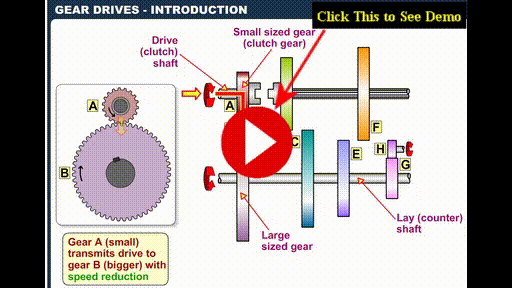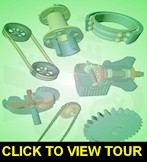Mechanical Power Transmission Training Certificate Course
- Home >
- vocational-training >
- mechanical >
- mechanical power transmission training
power transmission training:bearing and coupling types, gear and bearing failure types.
This mechanical power transmission training covers belt and chain drives extensively with interactive animations.

Tap the above picture for the mechanical power transmission training course demo.
Mechanical Power Transmission Training Demo - Content
Mechanical Power Transmission Training Course
ESBN: YY2-1243-6040-PI240
Description: (16 hrs)
This course on mechanical power transmission covers the basics, with many examples. This course also provides a thorough examination of bearing types and coupling types. This course features a comprehensive exploration of gear and bearing failure types.
This course on power transmission covers gear drives, couplings, bearings, belts, and chains. It also includes troubleshooting for gear and bearing failures. We based the findings on the observed failure symptoms. The course has complex, detailed graphics and animations. It provides a robust virtual understanding of mechanical power transmission.
- Gear Types, Classification, Gear Animation, Drive Types, and Gear Failures.
- Bearing Types, Classification, and Bearing Failure Troubleshooting.
- Couplings - Rigid and Flexible Coupling Types, Classification.
- Belt Drives and Chain Drives.
- Extensive 2D/3D graphics, models, and animations.
- Skill tests and certificate printouts.
The training on belt and chain drives covers the various belt drive types. It explains key concepts like orientation, tight and slack sides, slip, and creep. The course's graphics and animations provide a practical understanding of mechanical power transmission.
The gear drive training section includes gear classification. It covers Spur, Helical, Rack, Spiral Bevel, worm–worm wheel, Zerol, and Hypoid gears. It uses animation to show how the gears work. The training section also covers the gear ratio and types of gearboxes. Also, troubleshooting gear failure with interactive selection makes it a helpful reference tool.
The coupling training section covers various coupling types. Covering rigid, materially flexible, mechanically flexible, and other flexible couplings. Flange, Pin and Bush, Disc, Gear, Chain, Oldham, Universal joints, and Fluid Couplings are covered.
The bearing training section covers different bearing types. It also covers bearing classification based on friction and anti-friction bearings. Essential concepts like oil whirl and whip are also covered. It explains the types of bearings: radial, thrust, hydrodynamic, hydrostatic, ball, and roller. There is also an interactive tool for bearing failure troubleshooting. It shows the failure modes and their visual symptoms.
Who can benefit:
This course will increase the knowledge and confidence of students and staff. It is for maintenance and engineering teams. It is for those who need formal training in mechanical power transmission. The course covers most mechanical power transmission systems. Those trained in mechanical power transmission may find this course a good refresher. They may also learn some vital information outside of their original course.
Hardware Lock:
This course is also available using a "Hardware Lock" licensing method. Many users want to use the software on multiple computers. For example, they want to work with it on both their office and home computers. This Hardware Lock method allows users to install the software on as many computers as they like. They only need to enter the key on whichever computer they want to use the software. This copyright method also works great for the classroom environment.
Special Hardware Lock Bonus:
You can also ask us to embed your company logo in the training software for the hardware lock option.(Please note the URL of your company logo in the comments when ordering, or email your logo to us to use this feature.)
We will send an email confirming the order within 24 hours after purchase. If you ordered a downloadable version, check your email. It has the download link and activation code. We send a second email with tracking info if you ordered one of the shippable versions.
Download (1 Installation on 1 PC, Unlimited users, 1 User at a time.) $149
1 Hardware Lock (Unlimited Installations, Unlimited number of PCs, 1 User at a time.) $349
1 Network Hardware Lock (Network Installation, Unlimited number of PCs, 10 Users at a time.) $1049
1 Network Site License (Network Installation, Unlimited Simultaneous PCs and Users) $2100
Schools or companies needing a SCORM version of the above site license, please contact us and request a quote.
Power Transmission Training Course Contents:
- 1- INTRODUCTION
- 2- GEAR DRIVES
- 2.1- INTRODUCTION
- 2.2- INVOLUTE TOOTH PROFILE
- 2.3- GEAR TYPES
- 2.3.1- Gear Classification
- 2.3.2- Spur Gears
- 2.3.3- Helical Gears
- 2.3.4- Double Helical Gear / Herringbone Gears
- 2.3.5- Screw Gear Or Crossed Helical Gear
- 2.3.6- Internal Gear
- 2.3.7- Spur Rack Gear
- 2.3.8- Helical Rack Gear
- 2.3.9- Face Gear
- 2.3.10- Straight Bevel Gear
- 2.3.11- Spiral Bevel Gear
- 2.3.12- Zerol Gear
- 2.3.13- Hypoid Gear
- 2.3.14- Worm and Worm Wheel Gear
- 2.3.15- Double Enveloping Worm Gear
- 2.4- GEAR NOMENCLATURE
- 2.5- GEAR FAILURE / TROUBLESHOOTING (INTERACTIVE)
- 2.5.1- Polishing
- 2.5.2- Moderate wear
- 2.5.3- Excessive wear
- 2.5.4- Abrasive wear
- 2.5.5- Corrosive wear
- 2.5.6- Initial pitting
- 2.5.7- Destructive pitting
- 2.5.8- Electrical pitting
- 2.5.9- Spalling
- 2.5.10- Case crushing
- 2.5.11- Frosting
- 2.5.12- Moderate scoring
- 2.5.13- Localized scoring
- 2.5.14- Destructive scoring
- 2.5.15- Tip and root interference
- 2.5.16- Fatigue breakage
- 2.5.17- Overload breakage
- 2.5.18- Random fracture
- 2.5.19- Rim and web failure
- 2.5.20- Cold Flow
- 2.5.21- Ripping
- 2.5.22- Ridging
- 3- BELT and CHAIN DRIVE
- 3.1- BELT DRIVE
- 3.1.1- Slack & Tight Side
- 3.1.2- Basic Belt Types
- 3.1.3- Features & Types
- 3.1.3.1- Open Belt Drive
- 3.1.3.2- Crossed Belt Drive
- 3.1.3.3- Right Angle (Quarter Turn) Belt Drive
- 3.1.3.4- Stepped (Cone) Pulley Drive
- 3.1.3.5- Fast And Loose Pulley Drive
- 3.1.3.6- Jockey (Idler) Pulley
- 3.1.4- Belt Slip
- 3.1.5- Belt Creep
- 3.2- CHAIN DRIVE
- 3.2.1- Roller Chain
- 3.2.2- Inverted Tooth (Silent)
- 3.1- BELT DRIVE
- 4- COUPLINGS
- 4.1- RIGID COUPLINGS
- 4.1.1- Sleeve (Muff) Couplings
- 4.1.2- Sleeve Couplings with Pins
- 4.1.3- Cone Ring Compression Couplings
- 4.1.4- Clamp Couplings
- 4.1.5- Flange Couplings
- 4.2- FLEXIBLE COUPLINGS - MATERIALLY FLEXIBLE
- 4.2.1- Pin and Bush Coupling
- 4.2.2- Jaw Coupling
- 4.2.3- Tire Coupling
- 4.2.4- Bellow Coupling
- 4.2.5- Beam Coupling
- 4.2.6- Disc Coupling
- 4.2.7- Diaphragm Coupling
- 4.3- FLEXIBLE COUPLINGS - MECHANICALLY FLEXIBLE
- 4.3.1- Gear Coupling
- 4.3.2- Chain Coupling
- 4.3.3- Oldham Or Slide Coupling
- 4.3.4- Universal (Hooke'S) Joint Coupling
- 4.4- FLEXIBLE COUPLINGS - MISCELLANEOUS
- 4.4.1- Spring (Grid) Coupling
- 4.4.2- Fluid (Hydraulic) Coupling
- 4.1- RIGID COUPLINGS
- 5- BEARINGS
- 5.1- INTRODUCTION
- 5.2- FRICTION TYPE - RADIAL (JOURNAL) BEARINGS
- 5.2.1- Solid Bearings
- 5.2.2- Split Bearings
- 5.2.3- Self-Aligning Bearings
- 5.2.4- Tilting Pad Radial Bearings
- 5.3- FRICTION TYPE - THRUST BEARINGS
- 5.3.1- Tilting Pad Thrust Bearings
- 5.3.2- Kingsbury And Michell Bearings
- 5.3.3- Equalizing Type Thrust Bearings
- 5.4- FRICTION TYPE - HYDRODYNAMIC BEARINGS
- 5.4.1- Boundary Mode Lubrication
- 5.4.2- Mixed Mode Lubrication
- 5.4.3- Full Mode Lubrication
- 5.4.4- Bearing Operating Condition
- 5.4.5- Stribeck Curve
- 5.4.6- Oil Whirl and Oil Whip
- 5.4.7- Fixed Bore Concentric Bearings
- 5.4.7.1- Circumferential Groove Bearings
- 5.4.7.2- Axial Groove Bearings
- 5.4.7.3- Pressure Dam Bearings
- 5.4.8- Non-Concentric Bearings
- 5.4.8.1- Elliptical (Lemon Bore) Bearings
- 5.4.8.2- Three/Four Lobe Bearings
- 5.4.8.3- Offset Split Bearings
- 5.4.9- Tilting Pad Bearings
- 5.5- FRICTION TYPE - HYDROSTATIC BEARINGS
- 5.6- ANTI-FRICTION - BALL BEARINGS
- 5.6.1- Single Row Ball Bearings
- 5.6.2- Double Row Ball Bearings
- 5.6.3- Angular Contact Ball Bearings
- 5.6.3.1- Single Row
- 5.6.3.2- Tandem
- 5.6.3.3- Back-to-Back
- 5.6.3.4- Face to Face
- 5.6.3.5- Double Row
- 5.6.3.6- 4 Point Contact
- 5.6.4- Self Aligning Ball Bearings
- 5.6.5- Thrust Ball Bearings
- 5.6.5.1- Single Acting
- 5.6.5.2- Double Acting
- 5.6.6- Linear (Slide) Ball Bearings
- 5.7- ANTI-FRICTION - ROLLER BEARINGS
- 5.7.1- Cylindrical Roller Bearings
- 5.7.1.1- Free End
- 5.7.1.2- Limited Axial Load
- 5.7.1.3- Fixed End
- 5.7.2- Needle Roller Bearings
- 5.7.3- Tapered Roller Bearings
- 5.7.3.1- Single Row
- 5.7.3.2- Face to Face
- 5.7.3.3- Back-to-Back
- 5.7.3.4- Tandem
- 5.7.3.5- Double Row
- 5.7.3.6- Four Row
- 5.7.4- Spherical (Self Aligning) Roller Bearings
- 5.7.5- Barrel (Self Aligning) Roller Bearings
- 5.7.6- Thrust Roller Bearings - Cylindrical
- 5.7.7- Thrust Roller Bearings - Needle
- 5.7.8- Thrust Roller Bearings - Spherical
- 5.7.9- Thrust Roller Bearings - Tapered
- 5.7.1- Cylindrical Roller Bearings
- 5.8- SHIELDS AND SEALS
- 5.9- BEARING FAILURE / TROUBLESHOOTING (INTERACTIVE)
- 5.9.1- Spalling (Normal fatigue wear)
- 5.9.2- Excessive loads
- 5.9.3- Overheating
- 5.9.4- True brinelling
- 5.9.5- False brinelling
- 5.9.6- Reverse loading
- 5.9.7- Contamination
- 5.9.8- Lubrication failure
- 5.9.9- Corrosion
- 5.9.10- Misalignment
- 5.9.11- Loose fit
- 5.9.12- Tight fit
- 6- ASSESSMENT WITH EVALUATION AND CERTIFICATE PRINTOUT
Related Products:
Industrial Valves Training Software
Mechanical Seal and Selection Training
Centrifugal Pumps and Troubleshooting Guide
Hydraulics Training Certificate Course
Mechanical Training Courses Site Licenses
Please contact BIN95 with your questions and comments.

